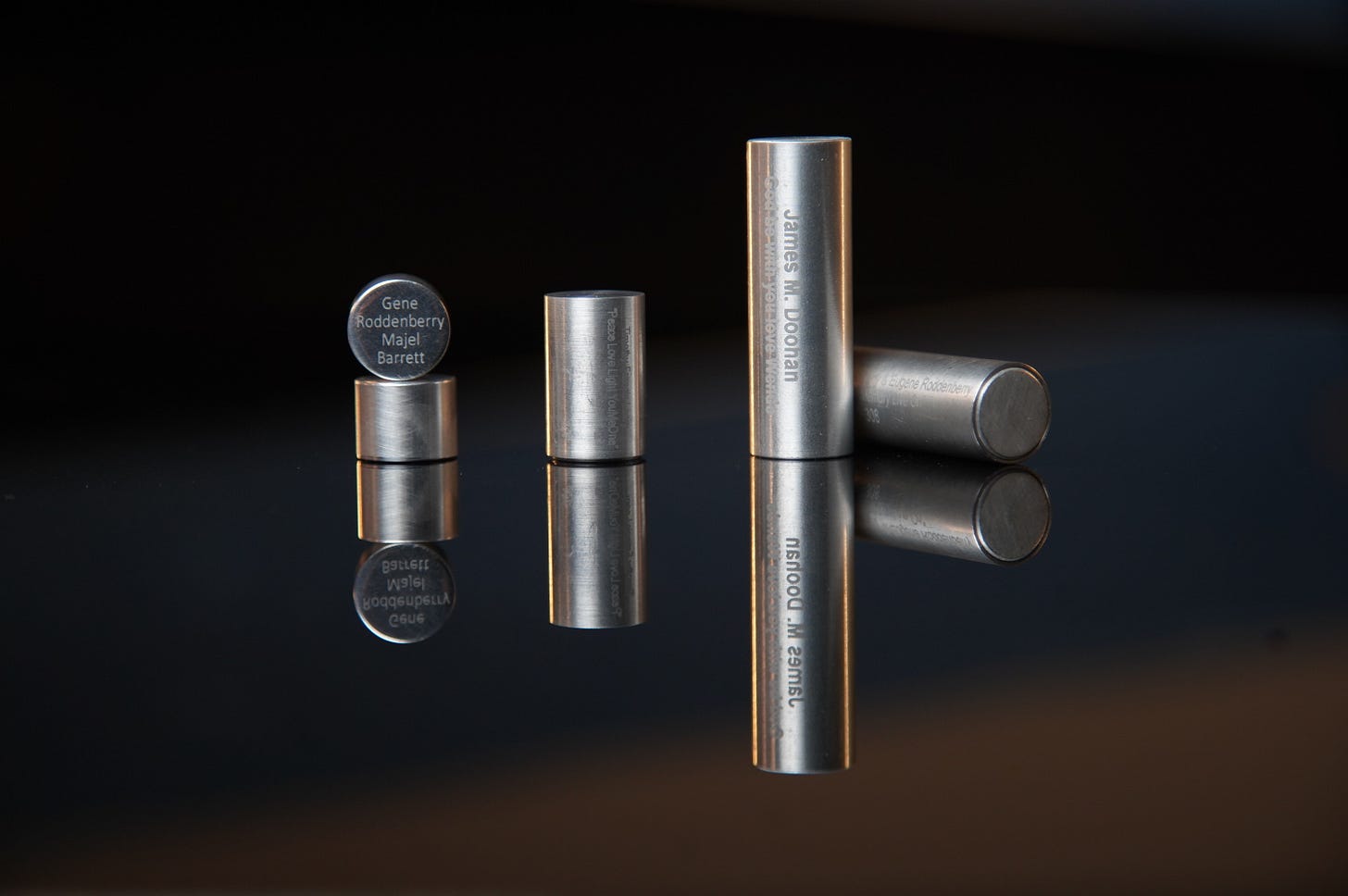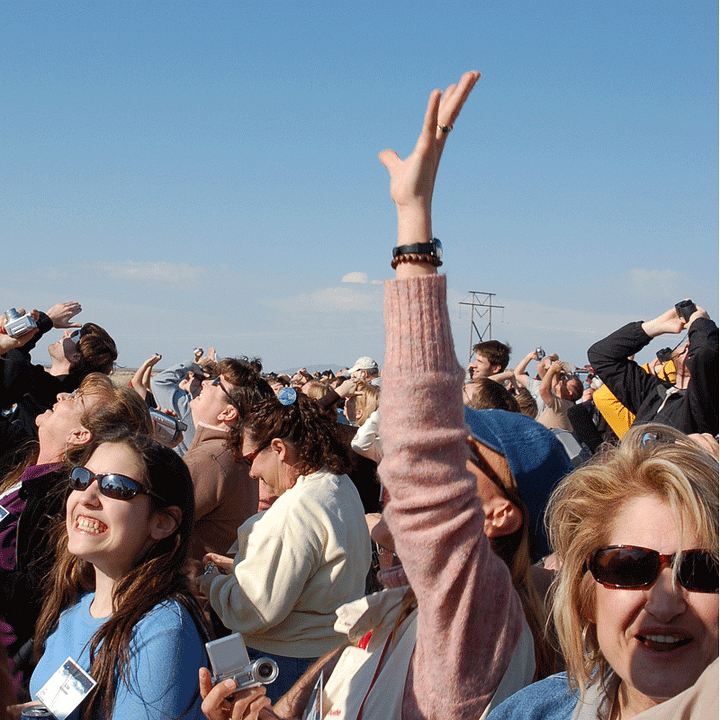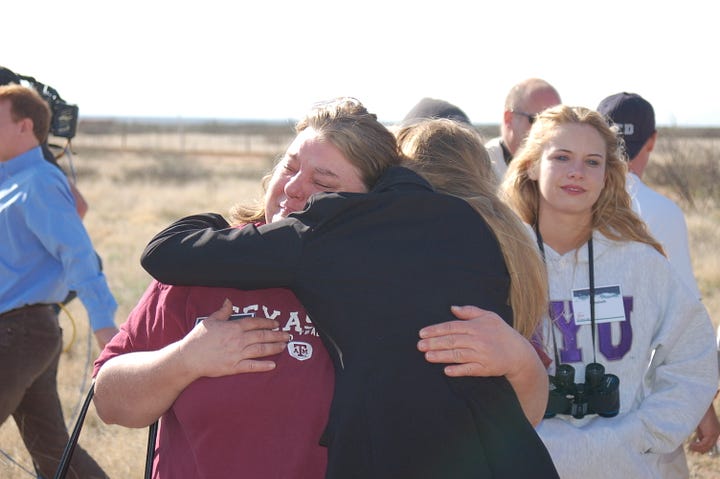Ashes among the stars: Loved ones laid to rest in orbit, on the moon and beyond
For some, heaven isn’t a metaphor. It’s a mission to the stars.

Few of us will ever touch the stars in our lifetime or witness the Earth from orbit. But in death, a new kind of journey begins. And one company is helping people and their pets embark on that journey.
For nearly 30 years, Celestis has offered those who have died a stairway to the stars, sending their ashes on memorial spaceflights that circle the Earth, touch the Moon and even travel into the quiet expanse of the cosmos.
Celestis flew its first memorial spaceflight mission in 1997, which included cremated remains and DNA from Star Trek creator Gene Roddenberry and others. As I reported on Monday, Celestis’ 25th mission launched from Vandenberg Space Force Base and included memorial capsules of over 150 people and a pet. The remains and DNA of over 2,500 people (and pets too) from nearly 35 countries have gone to space through Celestis’ memorial services. Those who have been aboard include astronauts and celebrities, including another Star Trek star, Nichelle Nichols, who is among more than 150 others currently on a celestial journey into deep space.
I spoke with the company’s CEO and co-founder, Charles M. Chafer, about the memorial spaceflights, which start at $3,495, and his thoughts on humans living permanently in space one day. And according to him, that day may come sooner than we think.
This interview has been edited and condensed for clarity.
Chandelis Duster: Can you talk about where the idea came from to honor people in this way?
Charles M. Chafer: I've traced the idea itself back to science fiction in the 1800s. People who were speculating about traveling into space talked about, ‘People are gonna pass away in space. How do we bury them? How do we honor them in space?’ But the modern idea began in the 1980s when a group in Florida, which actually was called the Celestis Group, approached a company I was working for that was developing private rockets and said, ‘Hey. We have this idea. We wanna launch 10,000 capsules of cremated remains on your rocket.’
About a decade plus later, the ability to get to space had begun to improve…So, we formed Celestis. We asked the original founders of the Celestis Group if we could use their name, and it wasn't copyrighted. But we felt like we ought to ask them, and they said yes. And we ended up flying all three of the founders who passed away over the years on some of our missions.
Wow. That is incredible. Can you walk through some of the missions and the ways people can honor their loved ones with a memorial space flight?
We offer four services. Earth Rise Service is characterized by the fact that we fly individual flight capsules, which have a symbolic portion of cremated remains or a DNA sample. We fly those to space and return them. [Earth Orbit Service], we fly them to orbit where they orbit attached to a spacecraft for usually about five years. And then, after five years in low Earth orbit, the laws of physics and gravity take over and bring that spacecraft back into the atmosphere, where it burns up entirely, creating a kind of shooting star effect.
[The Luna Service]. We were asked by NASA in the 1990s to help them honor one of their scientists, Dr. Eugene Shoemaker, making him the first person “buried on the moon.”
We also have our Voyager Deep Space Service, where, today, we have about 300 folks, including five of the original Star Trek cast…NASA astronauts, but mostly people from all around the world heading out on a two and a half year journey to 300,000,000 kilometers into deep space, which puts them in what's called a heliocentric orbit. Basically, they become a planet, if you will, orbiting around the sun. And they'll be out there at least as long as the sun is there….I would say every three or four years, we'll launch a deep space mission.
What goes through your mind as you see these missions take off and go up into the atmosphere? What are some emotions that you feel?
It's incredibly rewarding for not only me, but my staff to be able to fulfill dreams, to be able to help people achieve some sort of closure. Watching a mission last year, we had over 650 guests from around the world come to Cape Canaveral, watch that Voyager Mission. And just watching the people…every one of them is at some stage of grief because they lost somebody near and dear to them. But watching that transition from grief to literally joy and exaltation when that rocket lights up and lifts off…you don't see as much cheering and high-fiving at any other funeral service as you do at ours.


Why is it necessary to allow people to have the opportunity to allow their loved one to go on a mission like this, even though they are deceased?
Most funerals are for the living anyway. And so in reality, the service allows people to fulfill the dream. ‘Dad always wanted to go to space, but he could never do it.’ And we're finally making that dream come true…I think it's the coolest memorial service on or off the planet.
I imagine that it is very popular. Is there a waiting list of people who want to have their loved one honored in this way?
Most people don't have to wait too long, but we do have a large number of people who have signed up for this in advance. They're alive. They know that they want this, and they don't want to burden their loved ones when they pass with trying to figure out, ‘What do we do?’ So, they go ahead and contract with us while they're still alive, and the payments that they make to us, we put into a trust fund. And then when they pass, we fly them. We have one client that's purchased eight missions for his father.
Can animals go on these missions?
Yeah. We call it Celestis Pets. I've flown three of my Labrador Retrievers, but we fly many people's dogs and kitty cats. They deserve a ride to space, also.
Have you encountered any obstacles or any pushback in doing these memorial space flights? I know some people are really paying attention to a lot of things that are in lower Earth orbit and there's talk about space junk (which this is not junk). Has there been any concern about this?
We fly attached to a satellite or a rocket that's going there anyway. So, our little payload doesn't release in space. It doesn't contribute to orbital debris. And, therefore, it's designed from the beginning, from the get-go, to not add anything net into the space environment.
All commercial space flight is regulated in the U.S. by the Federal Aviation Administration and we have to get approval from them for every one of our missions. And one of the things that they look at is, ‘Do you contribute to orbital debris?’ So, we don't do that. We're all space nuts who work here. We wouldn't want to be involved in a business that's junking up outer space.
We’re seeing a lot of people wanting to go into outer space, people who are traditionally not astronauts. Katy Perry did a space flight recently and so did Gayle King. Do you think we, as people, are ready for more commercial space flights or do we still have a long way to go?
I think it's the former that we're seeing. We kind of believe that humanity needs to expand off the planet and throughout the solar system. We have to do it in this responsible way. Obviously, there's no one out there that we're gonna be colonizing that we're aware of. And so humanity, I think, just as we move to cross the oceans to the new world, we're now crossing into the new worlds of space. We're taking our civilization to space and we're going to take our rituals and our memorials and our celebrations with us as we go.
Do you think we'll get there anytime soon? Some people want to go to Mars. Do you think we're close or it's another 100 or 200 years?
At the rate we're going, I think we'll have large numbers of people permanently living off of planet Earth, certainly within 35 to 50 years.
You mean close to our neighbor, the moon, not on Mars or maybe both?
The moon is the first step or what are called space colonies, which are constructed space stations in space, but they're large and can sustain life. Humans are an exploring species, where when we're growing and exploring, we're a lot more productive as a civilization than when we're here beating up everybody for the increasingly small amount of resources left on the planet.
When it's your time to go rest among the stars, do you want to be honored with a memorial spaceflight? If so, what mission would you like to go on?
The short answer is yes. And what I've told my family and my staff is just keep flying me until you run out of me. I intend to be on several missions.
For people who are hearing about this for the first time or maybe considering something like this, what else should they know about memorial space flights?
We do a memorial service. We do receptions and have speakers. And so there's usually a two or three-day event built around the launch, which some families will bring 25 of their family members to be here and to witness the launch. We have astronauts or we have what I would call space luminaries come and tell them about what the launch is actually gonna look like from where you're watching it, but what does it look like from the flight director's console? Whenever we're allowed, we take people on a tour of the launch pad before the launch so they can say the final goodbyes. And, of course, we webcast everything that we're doing because not everyone who signs up with us can come to our launches, so they can experience it via livestream.
The next memorial spaceflight will launch in early 2026.






